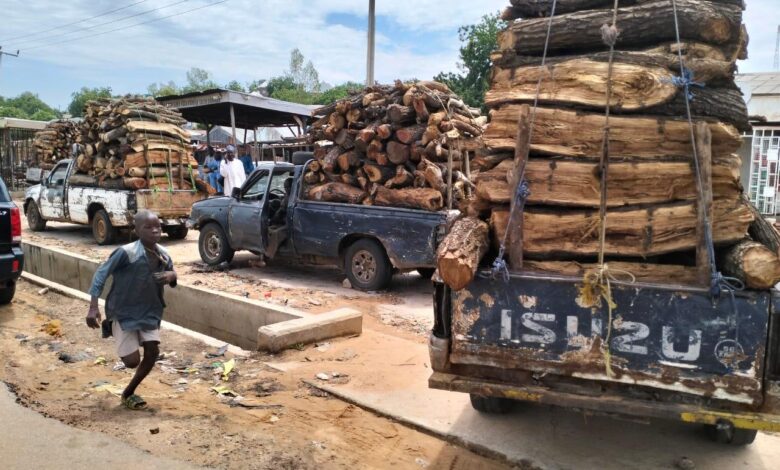Tree Felling Ban: Residents Struggle To Adjust In Nigeria’s Adamawa
As climate change drives the government to drastic measures, traders, some of whom consist of housewives and mostly lower-class residents, are left frustrated.

Fiona (surname withheld), a 56-year-old widow, makes little profit selling charcoal nowadays. A resident of Bachure in Yola, northeastern Nigeria, she used to buy the product for ₦2,000 and sell at the rate of ₦4,000. That, as far as she was concerned, was a decent profit.
Things changed for the worse when Governor Ahmadu Umaru Fintiri announced the ban on the burning and felling of trees on June 29, 2023.
“After the ban, the price of charcoal skyrocketed to ₦4,500 per bag,” she told HumAngle. “Now, there’s hardly any gain, but I continue with this business to keep myself occupied.”
Fiona revealed that her alternative business of grinding grains is no longer lucrative, leaving her with limited options. She agreed that the ban is a good measure to curtail the impact of climate change. “However, the government has not given us an alternative source of cooking fuel. We can’t afford to buy gas and kerosene to cook. I hope the government will take this into consideration,” she said.
Warning signs
In recent times, the global concern about climate change and its devastating effects has led governments and communities to take drastic measures to protect the environment. While Governor Fintiri’s decision aims to combat deforestation and preserve the fragile ecosystem, it has caused significant discomfort to buyers and sellers, especially those involved in the charcoal trade. They say they are left with no alternatives to their means of livelihood.
The impact of this decision is felt by women who happen to be the major retailers of firewood and charcoal in Adamawa State. Most of them are housewives who find it convenient to do business in the comfort of their homes. Their reason is simple – charcoal and firewood happen to be the most lucrative and convenient business for them.
Adamawa State, once adorned with lush forests and vibrant ecosystems, has fallen victim to the far-reaching effects of climate change. As temperatures rise and rainfall patterns become erratic, the delicate balance of the environment is disrupted. Deforestation exacerbates these issues, leading to soil erosion, flooding, loss of biodiversity, and adverse climatic conditions.
According to satellite analysis conducted by the United Nations Satellite Centre (UNOSAT), between Oct. 13 to 17 2022, up to 6.6 million people were potentially exposed to flooding and over 30,000 sq km of land has been flooded across the country. Adamawa is among the most affected states with an estimated 260,000 people potentially exposed to floods and around 1,000 sq km of land submerged across the state.
In response to the escalating environmental concerns, the Adamawa State governor took a bold step by imposing a ban on tree felling. This decision aimed to mitigate deforestation and protect the state’s natural resources. However, the ban has brought about unintended consequences, particularly for the buyers and sellers of charcoal and firewood in the state.
The struggle
Stephen Moses, 23, whose family depends on charcoal to cook paints a pathetic picture. “Due to the increased price of charcoal, my family has had to reduce the number of meals we cook at home from three to two,” he explained. The ban has forced them to manage the limited supply of the currently illegal product.
In Wuro Jabbe community, located in the Yola South local government area, Mallam Bashir, a 43-year-old charcoal seller, spoke about his struggles: “I sell charcoal because it’s a profitable and affordable option for many,” he said. “But with the ban, obtaining charcoal has become increasingly challenging because our suppliers get arrested, so everyone is scared. Not everyone can afford gas, so charcoal was the perfect choice. Now, I have shifted to the grain business as an alternative source of livelihood.” He noted that while they used to buy charcoal for 2,500 and sell it for 3,200, the prices have surged to 4,500 and above, greatly reducing profitability.
Naomi (surname withheld), a 21-year-old housewife living in Sabon Pegi, on the other hand, said she still sells charcoal because she does not have any other means of income. Previously, she bought it for ₦2,000 and sold it for ₦3,500, making a modest profit. However, with the ban which led to a rise in price to between ₦4,000 to ₦5,000, she reduced the quantity she sold “in order to maintain any semblance of profit.”
But someone like Malam Badamasi, a gateman supporting a wife and two children, has found an alternative in firewood, which is still part of the problem the government is trying to avoid. “I buy only three sticks of firewood each day and try to manage it for cooking once a day. Life has become harder and more frustrating with the rising fuel prices and this recent ban,” he said.
There are many others, some of them traders who continue dealing in charcoal for lack of an option and some, like Fatima (surname withheld) who hope to find a sustainable business alternative so as to earn a living without fear of prosecution.
Milcah Gaman is a 2023 HumAngle Accountability Fellow from Adamawa State.
Summary not available.
Support Our Journalism
There are millions of ordinary people affected by conflict in Africa whose stories are missing in the mainstream media. HumAngle is determined to tell those challenging and under-reported stories, hoping that the people impacted by these conflicts will find the safety and security they deserve.
To ensure that we continue to provide public service coverage, we have a small favour to ask you. We want you to be part of our journalistic endeavour by contributing a token to us.
Your donation will further promote a robust, free, and independent media.
Donate HereStay Closer To The Stories That Matter




